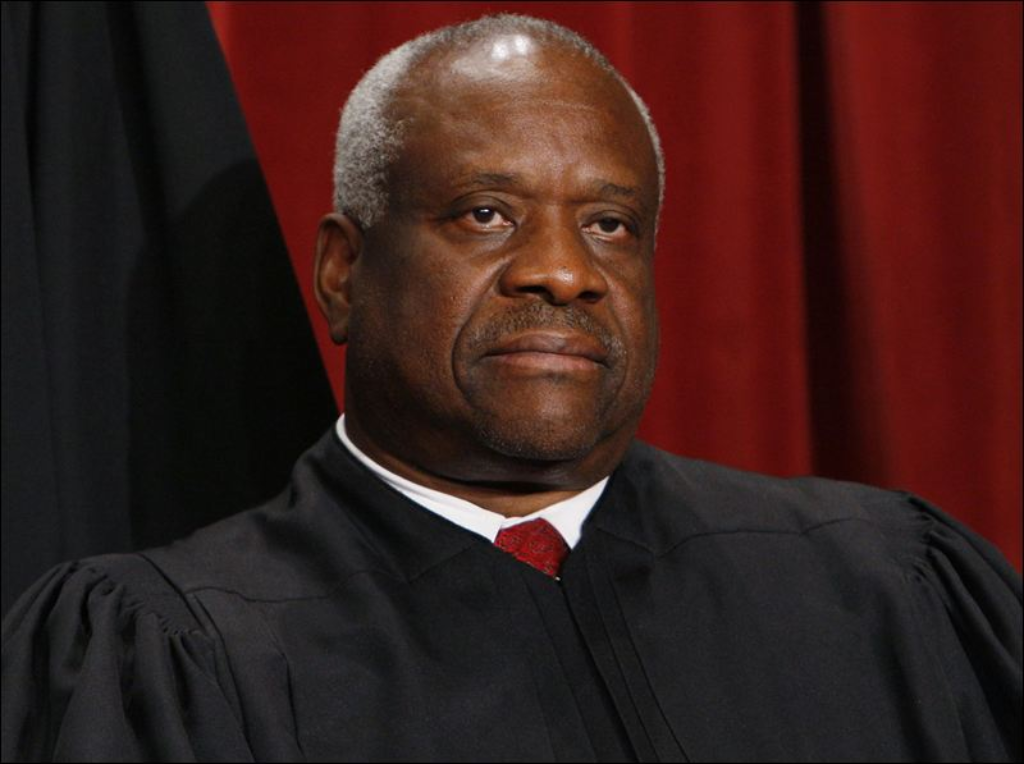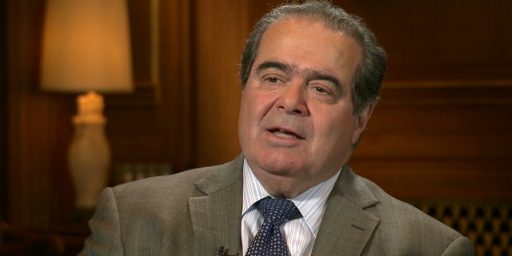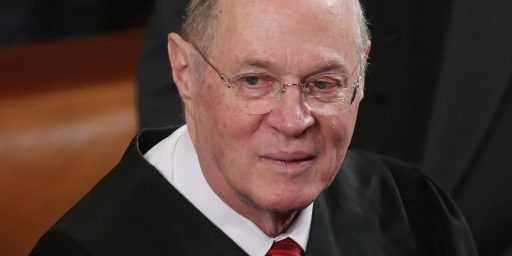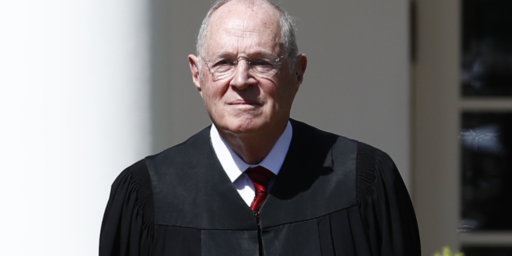Justice Thomas Quashes Retirement Rumors
Justice Clarence Thomas is seemingly putting to rest any reports that he's considering retiring in the near future.

At the end of the Supreme Court’s last term, Justice Anthony Kennedy announced that he was retiring, thus setting up the fight that eventually led to the confirmation of Justice Brett Kavanaugh. Kennedy’s retirement was the first since Justice John Paul Stevens, who replaced by Justice Elena Kagan, announced his retirement eight years earlier. Since then, the only other vacancy on the Court was, of course, the one created by the death of Justice Anontin Scalia in 2016. Eventually, of course, Scalia was replaced by Justice Neil Gorsuch, who was confirmed in April 2017. In the eight years between Stevens’ retirement and Kennedy’s, though, there were no other voluntary retirements on the nation’s highest court
With two years left in President Trump’s first term, there has been some speculation about whether we might see one more retirement before the 2020 election. For obvious reasons, it is unlikely that the two oldest members of the Court’s liberal wing would step aside while Republicans control both the White House and the Senate, so that leaves Justice Clarence Thomas. When Kennedy departed, Thomas became the longest-serving Justice on the Court, a status that, among other things, gives him the power to assign opinions in cases where the Chief Justice is not in the majority. Despite that status, there has been speculation over the past year that Thomas, who will turn 71 years old at the end of June, might decide to take this opportunity to step down while he can be assured that he’ll be replaced by a conservative Justice. Based on recent comments attributed to the Justice, though, it doesn’t appear as if he’s planning on going anywhere:
WASHINGTON — In rare public remarks, Justice Clarence Thomas on Monday dismissed what he called “this rumor that I was retiring.”
“I have no idea where this stuff comes from,” he said.
Justice Thomas, in a relaxed and reflective mood, was interviewed by David Rubenstein, a financier and philanthropist, in the Supreme Court’s courtroom as part of a series of lectures sponsored by the Supreme Court Historical Society.
“I really don’t have a lot of stress,” Justice Thomas said cheerfully. “I cause stress.”
Justice Thomas, 70, joined the court in 1991 and is now its longest-serving current member. Political scientists say he is the most conservative justice in the Supreme Court’s modern history.
He often writes concurring and dissenting opinions that are joined by no other justice. So far this term, he has called for the court to reconsider New York Times v. Sullivan, the landmark libel ruling, and argued that the fight for abortion rights shares roots with the eugenics movement.
Washington Post Supreme Court reporter Robert Barnes has more:
Justice Clarence Thomas said Monday that he has “no idea” where rumors started that he was going to retire from the Supreme Court this summer.
Thomas, 70, did not actually say during a conversation before the Supreme Court Historical Society that he was staying on the court. But he made it sound as though rumors of his departure were groundless.
“I have no idea where this stuff comes from,” he told David Rubenstein, the financier and philanthropist who interviewed him.
Rubenstein asked Thomas whether it was “enemies putting that out or your friends putting that out because they wanted you to rest more.”
“I think people just wanted to know what I was going to do,” Thomas said with a laugh, “since I couldn’t figure it out myself.”
He said he first heard the rumors from his wife, Ginni, “who gets these alerts.”
“She says, ‘What is it I don’t know?’ ” Thomas recalled. “I said, ‘What are you talking about?’ She said, ‘You’re going to retire.’ I said, ‘Wow — good to know that.’ I mean, you have to know every day what’s on your schedule.”
Thomas, the longest-serving justice and the anchor of the court’s conservative wing, has said before that he did not have plans to retire.
“I think one of the things you have to get used to, in this business, in here, is that people can say things about you, and for you, that have nothing to do with you,” Thomas said.
Justices are often the subject of retirement rumors, often instigated by those who want a justice to leave when a like-minded president can nominate a younger successor. Justices Ruth Bader Ginsburg and Stephen G. Breyer were on the receiving end of such speculation when President Barack Obama was in office.
In some sense, the speculation that has swirled around a possible retirement on Thomas’s part is similar to that which swirled around Ginsburg’s final term in office. As I’ve noted in the past, it did make a certain amount of sense in that Thomas would likely prefer being replaced by a fellow conservative Justice rather than one chosen by a Democratic President. Given that he is presented with a Republican Senate and a Republican-controlled Senate and that this is not an election year, many people assumed that, if Thomas was looking to retire it would be more likely to happen in 2019 than in 2020. This interview appears to foreclose that possibility and, indeed, make it seem unlikely that Thomas would consider retiring next year absent a significant change in circumstances.
Part of the speculation was also built on the idea that some people assumed that Thomas was ready to leave after his closest ally Justice Scalia passed away. Based on this interview, though, Thomas seems to be happy on the court, he seems to be healthy as well. Moreover, it is likely that the fact that the Supreme Court seems likely to have a working majority that tilts to the right for some time to come arguably may cause him to be eager to stick around to be a part of that. Finally, if Justices Breyer and Ginsburg are guides, he could choose to stay on the court for another decade or more if he chooses. What all this means, of course, is that it is unlikely that we’ll see a voluntary vacancy on the Supreme Court until after the Presidential election.






We need to start rethinking old age. People not only live longer these days, but are also healthier. Someone now 70, can conceivably live a productive decade more. BTW, I thought Thomas was older than 71.
This is not unprecedented, but in the past such people were outliers. Now they’re becoming the norm. What this also means is that 65 is rapidly becoming too young an age for retirement, especially as regards Social Security.
I would say that he’s just not ready to give up all the attention a Supreme Court Justice gets but the truth is, it’s been so long since he’d said anything I had forgotten he was still on the court. //
@Kathy: Middle class people with middle class incomes and middle class healthcare can remain productive at desk jobs. I retired at 70 and could have easily kept going longer. But I’m not sure that’s true for the janitor, or people on their feet all day, or assembly line workers, or anyone whose work is more physical and may not have great healthcare.
@OzarkHillbilly:
Better than the 14th amendment does not apply to white people/Schuette v. Coalition to Defend Affirmative Action Justices.
The Case Against Qualified Immunity, Part I
@gVOR08:
My father in law works construction. He even has a ‘cushy’ job operating heavy machinery. The stress his body went through when he was young, and even now just the constant vibrations from the machinery, have wrecked him. He doesn’t know if his body can hold out until 65.
@Paul L.: It’s a joke, about his well known reticence for speaking during arguments or even asking questions, which for the record I agree with the former and disagree with the latter, which is quite beside the point.
@Neil J Hudelson: Union carpenter here, almost 40 years in the trades. At 60+, my hands are shot, my shoulders shot, knees going, hips starting to complain. Bone spurs in my neck, 2 broken vertebrate in my back, deaf as a post in one ear and COPD (for which i probably take the lions share of the blame for smoking for almost 35 years starting at 16 but the copiuos amounts of concrete dust, gypsum dust, and saw dust inhaled over the years surely contributed). And no, I haven’t slept for more than 2-3 hours w/o interruption in years
When people talk about saving for retirement, my GenX/Millennial friends just say they’ll keep working. Relatively few people past retirement age are able to continue to work full-time, roughly 2/3rds either work part-time or are unable to work at all.
This is particularly true for women, who if they are healthy, end up becoming caregivers to aging parents as well as helping spouses, and increasingly helping out their adult children with daycare (caring for grandchildren).
@gVOR08:
Very good point, and amply illustrated by others above.
Still, it might be worth to set up a way to defer retirement benefits for those who keep working past 65, and to keep them contributing to the Social Security fund. Otherwise you’ll have people collecting for 10, 15, or 20 years, while they still receive income from a job.
@Kathy:
Congratulations, you’re a Republican!
It depends on the job. And the person. After about 50, the body and the mind start tapering off. See, for instance, Trump, Donald, whose mental decline we can watch.
People can’t retire at 65 because they cannot afford to, not because they are really capable of working past then.
@Gustopher:
Is it really necessary to resort to name-calling?
Life expectancy in the US is 78 years or so. This is an average, and no predictive for individuals. Still, it means that a lot of people will collect retirement benefits for 13 years.
It’s also not a basis for any decision, justa data point. I said it may be time to rethink old age. This means an in-depth study of life past 65, compared to the past and projected into the future. if warranted, retirement might be best changed upward. This might even be sorted out by income, with higher-income people retiring later than lower-income persons.
@Kathy: If you’re making a standard Republican argument for cutting social security…
The increase in life expectancy is partially because of a decrease in child mortality — children don’t really contribute to or collect from retirement programs.
And, the increase of life expectancy from age 65 is less because our 65 year olds are healthier today than it is that we are propping their failing bodies up longer.
And means testing frequently becomes a strategy for killing a social program, as middle income folks don’t like subsidizing the poor. Particularly certain poor people. You know which ones. Starts with the letter N. Creating a situation where people are paying more (progressive taxation) for less (means testing) builds exploitable resentment, while at the same time offering a new point to cut benefits while “reforming” the program.
@Gustopher:
That’s not what I’m doing.
And gains in life expectancy due to lower infant mortality do not rise that high, nor has infant mortality significantly decreased in the past decade, even as life expectancy keep climbing.